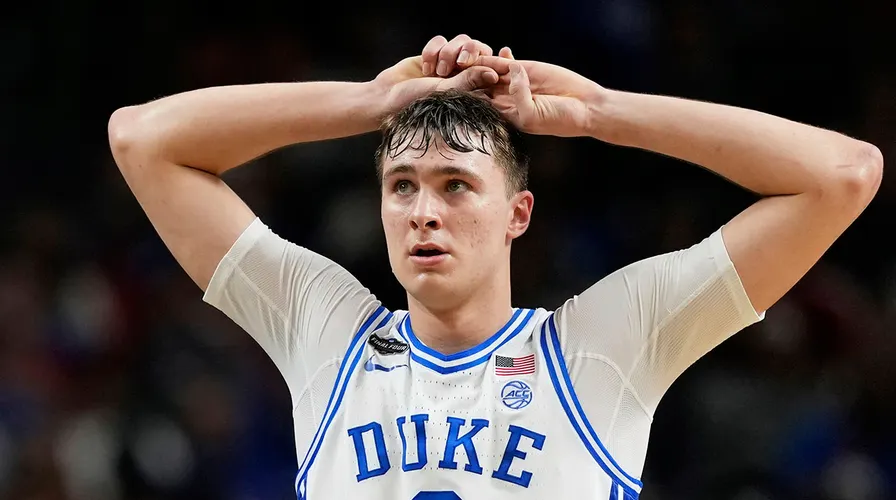The Boston Celtics’ third quarter collapse on Tuesday night can only be described as incredible. Boston was the better team for three quarters and lost to the Miami Heat because of one incredibly disastrous third quarter.
However, the issues surrounding that third quarter collapse extend well beyond the constraints of those 12 minutes. Despite the box score displaying a 24-point, 10–rebound double-double for Jaylen Brown, the Celtics superstar struggled in Game 1 for the second series in a row.
Brown’s subpar ballhandling, poor decision-making, and inability to make free throws cost the Celtics in a big way. Jayson Tatum’s play was inadequate as well, but Brown’s inconsistencies have been a theme throughout the postseason thus far.
After the contest, Brown was asked about what went wrong for the Celtics in the third quarter. He stated that the Celtics simply got “out of sorts”:
They went on the run. We got a little bit out of hands, out of sorts. Turned the ball over. Just gave away too many baskets. I think we lost the game in the third quarter.
The Heat outscored the Celtics 39-14 coming out of halftime, holding Boston to 2-of-15 shooting from the field. This period also happened to be Brown’s most catastrophic stretch of the game. He shot 0-of-4 from the field and turned the ball over twice. One was a travel and the other an errant pass into the middle of the floor.
Brown has struggled mightily with dribbling in traffic. His handle hasn’t been there this postseason, and it’s cost the Celtics valuable possessions dating back to their series against the Milwaukee Bucks. He could often be seen losing the ball or getting stripped while on his way to the basket.
Brown only had two turnovers in Game 1 (Tatum had seven, six in the third quarter alone), but his decision-making often got in the way as well. He shot 4-for-8 from three in the game, but that stat is not indicative of his performance.
Brown’s first made three came with 8:34 remaining in the first quarter, while the last three were all in the last seven minutes of the game. Most of the threes he did make were tough, fall-away looks that looked more like circus shots than quality attempts.
During his postgame press conference, Brown talked about making the right plays. He said that Game 1 was a poor showing from him and that he needs to be better in that area moving forward:
I just got to be able to make the right plays and see the game and read the game. And tonight wasn’t my better game doing that. I got to handle those situations a little bit better. I got a rhythm going later in the fourth quarter. And I think that was good carryover into the next game. But I definitely gotta be better for our team.
Although he shot efficiently from deep, the timeliness of his misses were what hurt Boston. Rather than working for better looks, Brown settled for a couple of early shot clock threes in the third quarter.
This one was somewhat excusable. Brown gets a relatively open three, but with Jimmy Butler rapidly closing in and 15 seconds left on the shot clock, driving the closeout may have been the better option.
However, this shot is fairly unjustifiable.
Brown is shooting well on pull-up threes this postseason, and if this shot went in, it would have been a huge momentum-swinger. But it didn’t. And even though Daniel Theis was there to clean up the mess, these types of shots kill runs.
Ime Udoka always stresses the idea of driving and kicking. He urges the Celtics to get multiple paint touches every possession in order to ensure they get the best shot possible. This is the exact opposite of that philosophy, with Brown choosing to play isolation basketball on the fastbreak. Again, Theis’ put-back erased the issue, but this is a dangerous rabbit hole to go down.
As Miami went on their third quarter run, Boston kept feeding into their plan. The Heat were continuously able to gain possession, get out in transition, and earn easy buckets. They scored 12 of their 39 points off turnovers. Brown said that the Celtics need to “be more poised in that situation.”
It took a team effort for the Celtics to collapse in the fashion that they did, but Brown’s sloppy performance was a primary factor. The All-Star forward has shown the ability to carry the Celtics’ offense in spurts, but if Boston wants to take down the East’s top team, he needs to be consistent. His red-hot fourth quarter embodied this message: too little, too late.
Brown followed up his Game 1 dud against Milwaukee with an offensive explosion in Game 2. He’ll have a chance to follow that same pattern on Thursday night in Game 2 against the Heat. Tip-off is set for 8:30 p.m. EST on ESPN.






